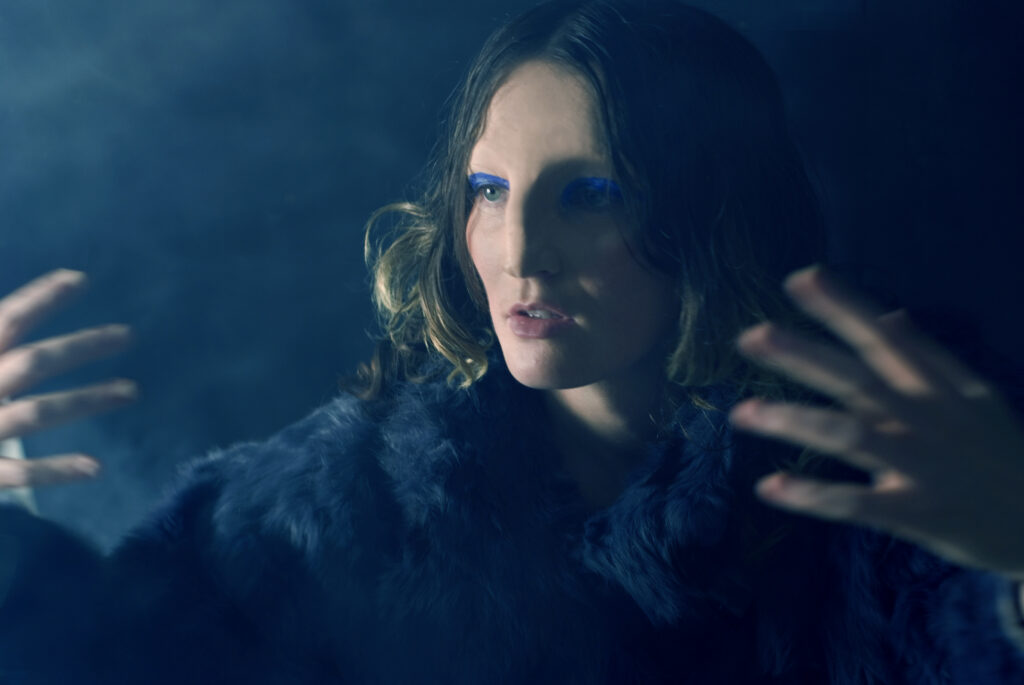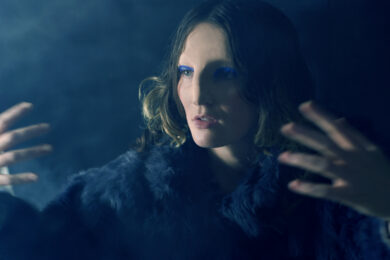Planningtorock is the solo project of Berlin-based, Bolton-bred Janine Rostron. After the operatic pop of her 2006 debut album Have It All, she recently released the stunning follow-up W on James Murphy’s DFA label. In fact, Murphy was so enamoured with Planningtorock that Rostron was invited to play at the ‘final’ LCD Soundsystem show back in April.
An air of intrigue surrounds the project; W shape-shifts both stylistically and emotionally, with Rostron deliberately injecting her vocal with mysterious androgyny. The cover art features a photo of her wearing a facial prosthetic and looking like a Roman Emperor. Planningtorock is seemingly designed to mess with your head.
However, in the flesh, Janine is decidedly down-to-earth. When we meet in a Shoreditch bar, she is halfway through a fleeting UK press romp. She has a fabulously filthy laugh and an air of mischief about her – and is anything but pretentiously enigmatic. Her music is harder to describe; for someone who cites Danielle Dax, Snakefinger, Peaches and the science-fiction writing of Doris Lessing as sources of inspiration, her new album has a distinctly otherworldly feel. It is wonderfully tongue-in-cheek, mixing bubbling melodrama with seedy Euro-disco and disconcerting experimental electronica – think Yoko Ono soundtracking John Waters’ Hairspray set in a Berlin nightclub.
Significantly, Rostron uses studio gadgetry to bend and warp her voice. The Balearic boogie of ‘Living It Out’ sounds like Kylie Minogue entrapped in a strip joint, while opener ‘Doorway’ and the gloriously debauched hymn ‘Manifesto’ distorts the vocal into a bellow of machismo, which Janine refers to as her "inner tranny". The desired effect of W succeeds in both disarming the listener and drawing them further into the Planningtorock web.
DOORWAY from planningtorock on Vimeo.
You have released W on James Murphy’s DFA label. I believe the initial contact was when James sent you a fan email – it must have been exciting to find out he liked your music?
Janine Rostron: Yeah, it was really sweet. The email just said ‘Really like the Planningtorock stuff – just sayin”. It was really flattering and a correspondence started from that naturally and we became friends. He invited me on [the Sounds of Silver] tour and after that he said he’d like to release my next record and asked what my plans were.
It would appear listening to W, that DFA have given you a pretty free reign.
JR: They have been incredibly supportive. They were very happy that I wanted to produce the album myself, and not via DFA, which may change for the next one, and they were like ‘whatever you want to do – just do your thing’.
Why was it so important to self-produce the album?
JR: I’m really into production and I’m also into producing my own sound because the sonics, in a way, is the language. I did try a little bit with other people, but it just became something else and it lost both intensity and identity. I do have other projects with other people, but the way Planningtorock grows is defined by me.
Well, W sounds pretty extraordinary. I’m struggling to think of a similar-sounding album.
JR: Actually, for a large percent of the record, I don’t know why I like it – it is music that is new to me as well. To a certain extent, I’ve evolved with it just as much as the audience might evolve with it.
The first thing that becomes apparent on listening to W is that either you have an incredible array of singing styles, or your vocals have been heavily treated. What were your reasons for such extreme manipulation?
JR: When I perform on stage I do achieve quite a variety of ways of singing. I was interested in trying to replicate that in the studio environment. I think it is an interesting alternative position, just to stretch people’s imagination, myself included, as to who is actually singing the song. It’s not to create alter-egos or characters – it always feels like me, even when the voice is extremely manipulated.
On the opening track ‘Doorway’ you sound like a robotic male baritone, while on ‘Living It Out’ you are almost breathlessly coquettish. I’m assuming that by being deliberately androgynous you get to stretch the concept further?
JR: Absolutely. I was really into playing with the androgyny of the voice, but more specifically the messing around sonically with my voice, in some cases, is pushing even more the emotion and making it even more melodramatic. Also it’s creating a voice that is still me but sings back to me from another position. It is also relative to each song. ‘Doorway’ is quite a sexual song and there is a sense of foreboding and I just wanted to go deeper with the voice. When I first heard it I just imagined a really amazing tranny singing it, it was so passionate.
So how does someone from a village outside Bolton get to the point of creating W? What was your introduction to music as a child?
JR: Classical music was my starting point. My mum would expose me to a lot of music and take me to really weird concerts when I was possibly too young. My introduction to non-classical music was still quite independent. I was 16 when I saw my first rock concert, a Royal Trux gig – Jennifer Herrema grunting like crazy, covered in fur, and songs that just went on and on. It just blew me away. Music has always been a big part of my life, it moves me, it educates me and it makes me grow. It is a fantastic language to help you explore ideas.
And then you went to art school before moving to your current home in Berlin. How did these periods of your life shape you artistically?
JR: At art school, I started making video and also started to explore the music and the video, and how to bring the things together. When I moved to Berlin I got more into performing. These three languages – the video, the music and the live performance – are awesome to bring together.
And Berlin must have given you a huge creative jolt?
JR: I had not anticipated the effect it would have on what I was trying to achieve creatively. It gave me incredible focus. The music suddenly became important enough for me to build my own sound studio and start to prepare songs to possibly put out into the world.
Were you a part of a ‘scene’ in Berlin?
JR: No. If I am honest, I have never been part of a scene. I’ve always been a bit of an island really, but I am fine with that. A few years ago I did find that hard, like it was a negative thing about what I do, but now I know it is just the way it is – and that’s fine.
You have talked about your love of video. It would seem that your image is very carefully constructed. Many of your press shots show images of you wearing masks or in heavy make-up. On the cover of W (and in the promo video for ‘Doorway’), you are wearing a prosthetic which almost makes you look like Nero. What is your thinking behind these strong images?
JR: The visual part of Planningtorock is an attempt to visually represent what I am trying to do on the record. When it came to making a video for ‘Doorway’, previously I had always messed around with what I do and don’t reveal using masks and helmets – not to hide but to add. So, the prosthetic was just a way to play with the notion of what gender I was. Not ‘is she a man or is she a woman?’ but more about ‘who is this person?’ to try and draw you into my head. Also, I feel that the internal worlds of women are not that well represented by society. It is not an immediate thing people think about – the imagination of women or women’s philosophy.
Can you explain that a little more – the link between societal attitudes towards women as ‘thinkers’ and how you, personally, represent yourself?
JR: Maybe there is a feeling that women get judged more about how they look and how they present themselves visually as opposed to what they are thinking and feeling. Especially as a female performer that happens a lot, and I think that is regressing even more, which I find really sad. So, the masks and prosthetics are also my way of trying to draw people in and make them more curious about my internal world – even though I did do something external.
THE BREAKS from planningtorock on Vimeo.
You’ve also described your internal world as ‘Planet Nine’ – partly inspired by a Doris Lessing novel The Making of the Representative for Planet 8. You are going to have to help me with this one.
JR: I have been reading her trilogy and I was pretty psyched about a female science-fiction writer. I thought that was pretty rare thing. The representation of ‘Planet 8’ is just this really great concept of constructing another world and [exploring] the parallels between our world and their worlds. I wrote a song called ‘Planet Nine’ which turned into a monster and it didn’t make the record but I want it to be a 20-minute piece. It might be released as a one-off.
One song that did make the record was your version of Arthur Russell’s ‘Janine’. Apart from having your name on it, what drew you to that song in particular?
JR: Somebody sent me that song, because – obviously – I am called Janine. The lyrics just blew me away, it is such a fantastic message and I took it very personally. I’d never done a cover before and I had this funny bassline and I just began to improvise those lyrics on top of it.
And, finally, have you an idea of what the next Planningtorock album might sound like?
JR: I think, quietly, I’m curious to see what it is like to make a dance record, so maybe the next Planningtorock record will be more dance. Now, I’d like to ask you a question.
Okay, I’m game. Fire away.
JR: I always want to know which tracks are the journalists’ favourites.
Well, I like ‘I Am Your Man’ – which sounds like your amazing tranny again – and I love ‘Manifesto’ and its reference to ‘suckular love’.
JR: Ha ha. It is a play on words; it is ‘suckular’ and ‘circular’ and sometimes ‘secular’. It is visionary and rude at the same time. Maybe that’s a perfect description of Planningtorock – rudely visionary.
New Planningtorock LP W is out now



